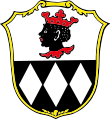Wake (heraldry)
A Wake (also Wachel, loose or cards ) referred to in the Heraldry a diamond that is slightly slimmer than a square. Awakened denotes a pattern of awakenings of equal size and direction.
Design and blazon
The pattern is created by dividing the coat of arms at an angle to the right and left. The resulting geometrical figures are pointed rhombuses . The coat of arms or the coat of arms field is then described as awakened . If the rhombuses are thick, i.e. a displaced square, they become as roughened (roughened) , slimmer (two obtuse and two acute angles) than wecke , very slender than spindles ( spindled ). Individual figures are seldom called `` Wecke '', a diamond or spindle is preferred here . The transition from rhombus and wake to the spindle is fluid - as always, the wording of the blazon counts in heraldry, the drawing of the coat of arms is then free within limits or follows tradition.
In the older heraldry no distinction was made between lozenges and awakenings, and the distinction can only be found in German heraldry and regionally. So you can see the white and blue diamonds in the Bavarian state flag in the usual representation also aroused describe.
The location and number of awakenings must be carefully observed and described ( blazon ), as this is where the differences lie for the heraldist . If the rolls are in a vertical position with respect to their longitudinal axis, this is the normal case, then it is called awakened (similarly roughened ), with other positions with an addition. The same rules apply here as described for the diamond .
Special heraldic pictures with the Wecke are wecken beam , Weckenkreuz and the weir hanger. The latter is an older name for inclined, connected wake (or rhombuses) on the dividing line.
Then there are the "Teckschen Wecken" from the noble family of the Dukes of Teck .
Examples
Blue and silver awakened diagonally (Palatinate diamonds (Wecken), Neckar-Odenwald district )
crossed by silver and blue (four columns) ( Oftersheim )
Three awakenings in the Ismaning coat of arms
Weir hangings in the coat of arms of those of Metzradt
Biel-Benken BL
Coat of arms of the Dukes of Teck
Scheibler's Register of Arms 1450–1480
See also
literature
- Wecke (Heraldry) in the Heraldry Wiki
Individual evidence
- ↑ a b Gert Oswald : Lexicon of Heraldry. Bibliographisches Institut, Leipzig 1984, p. 439.





